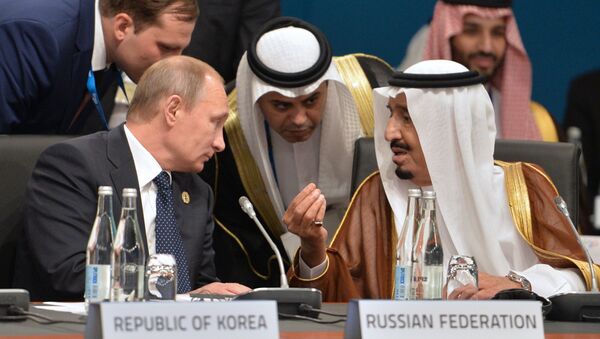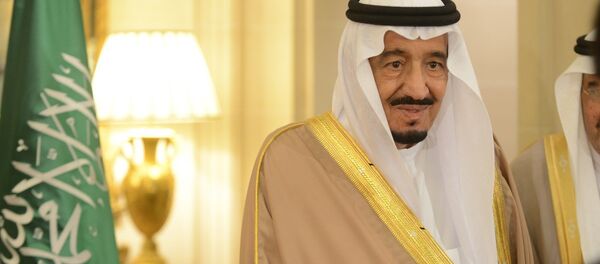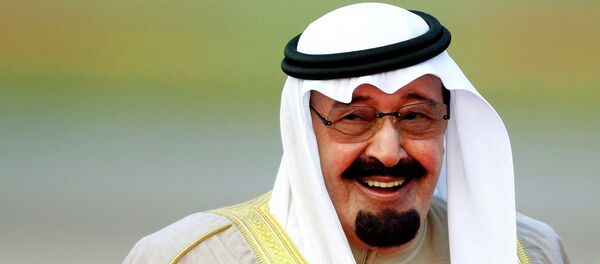MOSCOW, January 23 (Sputnik) — The Soviet Union was the first country to recognize the independent Kingdom of Hejaz and Nejd, which was renamed the Kingdom of Saudi Arabia in 1932.
Moscow established diplomatic relations with the Kingdom of Hejaz and Nejd on February 19, 1926. In 1938, the Soviet mission in Jeddah was closed and diplomatic relations between the two countries were severed due to the Soviet Union’s domestic problems, with its foreign relations, as well as a change of priorities by Saudi Arabia, which opted for closer cooperation with the West.
On December 30, 1991, Saudi Arabia recognized the Russian Federation as the legal successor of the Soviet Union.
In November 1994, Prime Minister Viktor Chernomyrdin visited Riyadh, signing a general agreement with Saudi Arabia during a tour of the member states of the Cooperation Council for the Arab States of the Gulf, also known as the Gulf Cooperation Council or GCC.
In September 2003, Crown Prince Abdullah bin Abdulaziz al-Saud, who later was the sixth king of Saudi Arabia from 2005 to 2015, came to Moscow on an official visit, during which he held talks with President Vladimir Putin.
In February 2007, President Putin made an official visit to Saudi Arabia. In November 2007, Crown Prince Sultan bin Abdulaziz al-Saud, who was defense and aviation minister and inspector general, visited Moscow.
Russia and Saudi Arabia have been actively developing dialogue between their foreign ministries. Russian foreign ministers have made a number of visits to Saudi Arabia: Andrei Kozyrev in April 1992 and October 1994, Igor Ivanov in November 2000 and in April 2004 as security council secretary, and Sergei Lavrov in May 2006 and November 2012.
Saudi Arabian Foreign Minister Saud al-Faisal visited Russia in January 1992, April 1999, April 2002, May 2003, June 2006, February 2008, March 2011 and November 2014.
The Russian and Saudi deputy foreign ministers and department heads conduct regular consultations on foreign policy issues.
Ties between the countries’ parliaments were established in May 1996, during a visit to Riyadh by a group of Russian parliamentarians led by Alexei Mitrofanov, head of the State Duma’s geopolitics committee.
Russian-Saudi trade grew steadily in 2003-2013 from $235 million in 2005 to $450 million in 2008 and $1 billion in 2012. In 2012, Saudi exports amounted to $395 billion and imports to $136.8 billion. Russia accounts for 0.2 percent of Saudi Arabia’s foreign trade.
Trade turnover remains unbalanced with Russian exports accounting for almost 99 percent. Russia delivers steel and copper wire, barley, copper rods, pipes, drilling tools and semi-processed metal products. In turn, Saudi Arabia primarily exports petrochemicals. Bilateral investment cooperation is not developing, with a LUKoil investment project being the only exception. In 2004, LUKoil signed a contract to prospect for and extract hydrocarbon deposits in Saudi Arabia for 40 years and established the LUKSAR joint venture with the company Saudi Aramco. The project received over $500 million in investment during the prospecting and evaluation stage.
The Russian Chamber of Commerce and Industry established the Russian-Saudi Business Council to help implement trade and economic projects as part of a bilateral cooperation program.
Bilateral space cooperation is another area seeing developing ties. Since September 2000, Russian launch vehicles have orbited about 20 Saudi communications and remote sensing satellites. Since 2008, Russian space agency Roscosmos and the Foreign Ministry has been working on drafting a contractual-legal framework on space with Saudi Arabia. This includes cooperation agreements in peaceful space exploration, the development of the GLONASS communications satellite cluster and its joint use.
Cultural ties, especially those between Muslim organizations, are growing. Since 2002, the Russian Hajj Mission has been representing the Hajj council at the Russian government’s commission on religious organizations and has been assisting Russian believers on their pilgrimages. About 20,500 pilgrims from Russia visit the Muslim holy cities of Mecca and Medina annually.
In September 2003, both countries signed a memorandum of understanding on establishing direct ties between the Russian Academy of Sciences and King Abdulaziz University (KAU), the largest science and technological center in Saudi Arabia. The document also established relations with the Saudi Foreign Ministry’s Information and Studies Center and the country’s Astronomy and Geophysics Institute. The most active cooperation projects involve the Russian Academy of Sciences’ Institute of Astronomy and Institute of Oriental Studies, as well as the International Institute of Earthquake Prediction Theory and Mathematical Geophysics (IEPT).
The Saudi Embassy in Moscow provides financial assistance to the development of Muslim education in Tatarstan and other Russian regions through the Council of Russian Muftis.
In 2004, the first group of Saudi students arrived in Russia to pursue their education in the country on a scholarship.
In September 2011, the State Hermitage hosted "Roads of Arabia,” an archeological exhibition featuring UNESCO World Heritage Sites. Over 60,000 people visited this exhibition.



